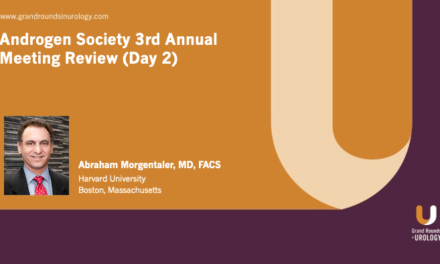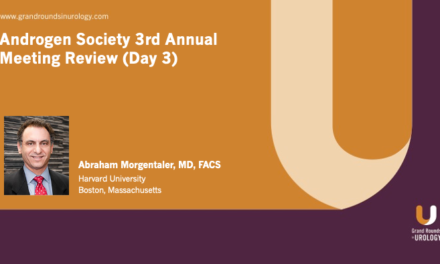Daniel Kelly, PhD, presented “The Science of Testosterone and Atherosclerosis” for the Grand Rounds in Urology audience in July 2021.
How to cite: Kelly, Daniel. “The Science of Testosterone and Atherosclerosis” July 2021. Accessed Dec 2024. https://dev.grandroundsinurology.com/the-science-of-testosterone-and-atherosclerosis/
The Science of Testosterone and Atherosclerosis – Summary:
Daniel Kelly, PhD, Senior Lecturer of Biochemistry at Sheffield Hallam University, outlines and reviews data on testosterone’s impact on atherosclerosis. He outlines the key stages of atherosclerosis: monocyte activation, monocyte activation/adhesion, monocyte migration, and macrophage activation. Dr. Kelly then discusses how testosterone impacts each stage with supporting studies. The STRIDE study demonstrated that testosterone reduces the atherogenic cytokine TNFα in the isolated monocytes of diabetic men. Dr. Kelly examines data showing that testosterone may reduce monocyte infiltration but may also promote monocyte adhesion. He explains that overexpression of LOX-1 is associated with lipid-laden foam cell formation and the enhancement of a pro-inflammatory phenotype in macrophages during activation. Citing a study on rabbit and mice cells, he notes about a 50% increase in LOX-1 lesion area in castrated rabbits and about a 15-20% reduction in foam cell formation area in mice cells treated with testosterone. Another study shows that testosterone promotes cholesterol clearance from lipid-laden macrophage cell lines of about 25%. Dr. Kelly reviews a study showing that esterified and non-esterified cholesterol were seen to be reduced by about 20% following testosterone treatment. He concludes that T has a complex role in treating atherosclerosis that is context-bound, depending on the stage and location of the disease.
ABOUT THE AUTHOR
Daniel is a lecturer in Biochemistry with research interests in cardiovascular disease, type-2 diabetes, obesity, and specifically the role of testosterone in these diseases. Daniel's current research focuses on testosterone’s tissue-specific metabolic actions and how these relate to cardiovascular risk and type-2 diabetes in males using cell culture systems, pre-clinical models and medical trials of testosterone replacement. This research extends through ongoing collaborations with partners at the University of Sheffield, University of Chile, Barnsley NHS Foundation Trust and Bayer Healthcare. His research is published in top endocrine peer-reviewed journals as original manuscripts and critical reviews. He has presented at international conferences and his research has featured in BBC News Health, The Conversation, UroToday, and Men’s Fitness magazine. He also won the Kroto Research Inspiration 2016 award at the University of Sheffield and the Asian Journal of Andrology outstanding paper award 2020.
Additionally, Daniel is a Fellow of the Higher Education Academy. His teaching areas relate to his research interests and include metabolism, endocrinology, cell biology, and biological basis of disease.



